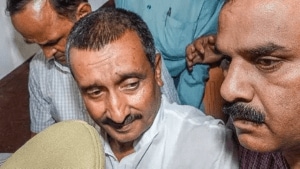Up Close and Wild
He bagged the Green Oscar with a film on sharks. Now Mike Pandey predicts the future of Indian vultures. By Nitya Rao

HAVE you tickled it at its exit?8217;8217; asks wildlife film-maker Mike Hari Pandey, as his assistant peers into a large cardboard carton that houses a baby kite with a broken wing. 8216;8216;Their mothers usually do that to make them excrete,8217;8217; he explains. Pandey should know, for he8217;s used to playing surrogate to the numerous animals and birds he has shaped his life around.
His gut-wrenching film, Shores of Silence: Whale Sharks in India, on the disappearance of the badi machchli from coastal Gujarat, jolted the international community to outlaw the hunting of these creatures. It also got him the top award at the annual Wild Screen Film Festival8212;popularly known as the Green Oscar8212;held at Bristol every year.
His latest muse is the Indian vulture, 8216;8216;nature8217;s municipal corporation8217;8217;8212;also the subject of his latest documentary Vanishing Vultures.
8216;8216;I couldn8217;t have made this film without the older footage I had,8217;8217; says the burly filmmaker, settling into his workspace at Riverbank Studios in south Delhi. 8216;8216;Back in the 8217;70s, I used to travel a lot. I remember filming vultures around abattoirs in Kanpur, Madhya Pradesh and Uttar Pradesh. Once, we came across three fresh carcasses; within minutes at least 20,000 vultures descended and stripped them bare.8217;8217; There were so many birds that his crew were worried that Pandey would be attacked.
He didn8217;t have to travel far to spot the resilient scavengers. They were everywhere: around poultry farms in Saket, south Delhi, near Janpath, and some even hovered over the Prime Minister8217;s house.
Today, thanks to Diclofenac, a pain reliever and anti-inflammatory veterinary medicine, a drug that also causes kidney failure in the birds, the numbers have dipped alarmingly to a few thousand. 8216;8216;Without them the earth would be encrusted with a layer of putrefying waste a kilometre thick,8217;8217; says Pandey. Authorities have so far been apathetic. Pandey points out that the PMO, where he used to spot vultures in the 8217;70s, issued a directive to ban the drug a year ago.
The consequences, according to Pandey, are dark. 8216;8216;We8217;re not a beef-eating nation. If carcasses pile up, they act as a trove for viruses that could be far more dangerous than the avian flu,8217;8217; he predicts.
Pandey8217;s waiting to give creative vent to a host of other ideas. 8216;8216;I want to make a film on a tree. Did you know that if you add up all the benefits that a single tree provides in its lifetime, it amounts to approximately Rs 352 crore?8217;8217; he asks.
There8217;s also a feature film called Hakuna Matata, where a group of children get lost in the jungle and learn basic survival skills in the forest. 8216;8216;It8217;s about a group of NRI kids, whose parents are fussy about them drinking Indian water and eating Indian food,8217;8217; he grins.
Pandey is also delighted that starting next month, Doordarshan will have its own dedicated wildlife slot called Earth Matters, for which he will be producing documentaries. 8216;8216;It8217;s very encouraging,8221; he says. His excitement about yet another wild trail is unmistakable.
- 01
- 02
- 03
- 04
- 05































